
Letter from the CEO
Exploring New Ways to Use Data for Good
Since Population Reference Bureau’s (PRB’s) founding in 1929, the world has changed tremendously and PRB has evolved along with it. We continue to explore new ways of working (globally, locally, even remotely) and hone our expertise to offer solutions relevant to today’s health and well-being challenges, such as the growing prevalence of noncommunicable diseases and the increase in anxiety among young people. What hasn’t changed is PRB’s impact on informing evidence-based practices, which you’ll see highlighted in this report.
In Fiscal Year 2023, we reached wide audiences with analyses and assessments on issues such as population aging, climate adaptation, maternal health, unpaid care work, and big data. We partnered with organizations like the Conrad N. Hilton Foundation, Regional Consortium for Research on Generational Economy, Southern California Association of Governments, and William and Flora Hewlett Foundation. And the people who work here have made it all possible.
Part of any organization’s evolution is change in those people. From PRB’s original staff of 8 to 55 today, we’ve seen a lot of great people walk through our doors. In late 2022, we welcomed a new Vice President to lead our U.S. Programs, Diana Elliott. Midway through 2023, we appointed our first Africa Director, Aïssata Fall. And just a few months ago, PRB’s Board of Trustees appointed me as President and CEO. PRB’s new leadership is guided by the organization’s strategic plan to explore new areas of focus and ways of working while keeping population and demographic data at the core of what we do. It is a strong foundation from which to move forward toward our 100th year in 2029.
Our partners outside the organization are also essential to PRB’s success. My predecessor, Jeffrey Jordan, collaborated with other international organizations in 2023 on the TIME Initiative, an ongoing effort to answer hard questions about the evolving role of international nongovernmental organizations working in sexual and reproductive health and rights. I am pleased to be stepping into this space as I take the helm at PRB.
Barbara Seligman, Senior Vice President of International Programs, led the way in making PRB’s presence more prominent in 2023 as she advocated for our return to hosting more public events like the webinar on young Africa’s potential to power the global workforce. Diana Elliott quickly became another energetic force behind PRB’s increased public engagement, from authoring blogs that delve into the heart of current population concerns to speaking with the media and other organizations. And Reena Atuma, our Team Lead in Kenya, works daily alongside staff and local officials, youth, and others on concrete policy changes aimed at improving people’s health.
There’s so much more. We’ve captured some of the highlights for you in this year’s annual report.
Sincerely,


President and CEO
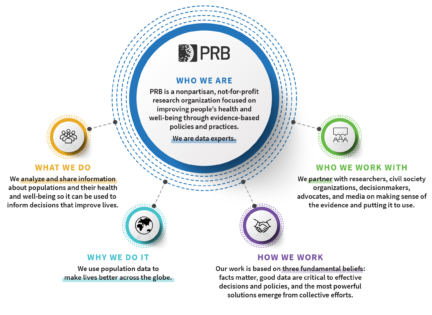
![]()
Promoting community-led social and policy change in partnership with youth and radio stations in Malawi
Project: PROPEL Health
Funder: United States Agency for International Development (USAID)
Under the PROPEL Health project, we worked with partner radio stations and community youth in nine districts across Malawi to raise awareness of social challenges around topics concerning nutrition, education, and health services; and harmful cultural norms like child marriage. We supported these local actors in their efforts to make context-specific, change-oriented information on these topics available in their communities and get people talking about them.
And they’ve made an impact.
Local radio programs in Malawi are now using their platform to hold leaders accountable for enforcing the child marriage law, and they are educating communities on how to respond to and prevent gender-based violence.
After a series of radio programs on child, early, and forced marriage and gender-based violence aired, a traditional authority in Monkey Bay in Malawi’s Southern Region publicly committed to enforcing the law against child and forced marriage, stating, “Dzimwe Radio has been insisting that I intervene and show my commitment in dealing with child marriages—hence my order to demote those village heads [found to not be enforcing the law].” In Mchinji, in Malawi’s Central Region, local police began holding town meetings about gender-based violence, and community members involved police and victim support units in investigations that led to the dissolution of child marriages, and arrests and fines for adult perpetrators.
And after Mudzi Wathu Radio aired programs about youth mental health challenges and the lack of available care, Mr. Biziwiki Mwatibu Banda, the clinical officer at Mchinji District Referral Hospital, announced, “We are very thankful to Mudzi Wathu Community Radio for giving youth a platform to express their views and present their complaints… After hearing those complaints, our management decided to train one health care provider from each of the 21 health centers, aiming to provide mental health counseling in all rural areas.”
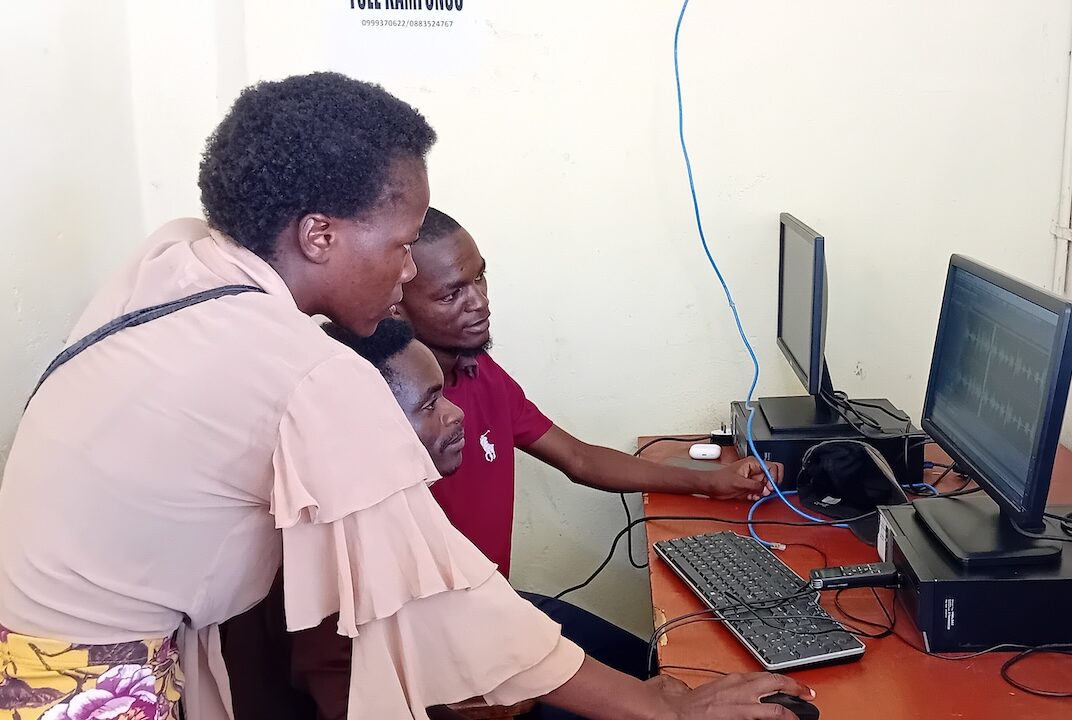
Photo credit: Developing Radio Partners (DRP)
In the process of spurring these positive changes—and many more like them—the young people involved in this work learned valuable skills that help provide them with more academic and professional opportunities.
Amplifying research and data to raise awareness of the Black maternal health crisis in the United States
Project: Center for Public Information on Population Research
Funder: Eunice Kenney Shriver National Institute of Child Health and Human Development (NICHD)
Black women in the United States face a high risk of death from pregnancy-related complications. Most of these deaths are preventable, according to a study by the Centers for Disease Control and Prevention. “We need new models of care before, during, and after birth to address these inequities,” says Marie Thoma, a reproductive and perinatal epidemiologist and population health scientist at the University of Maryland.
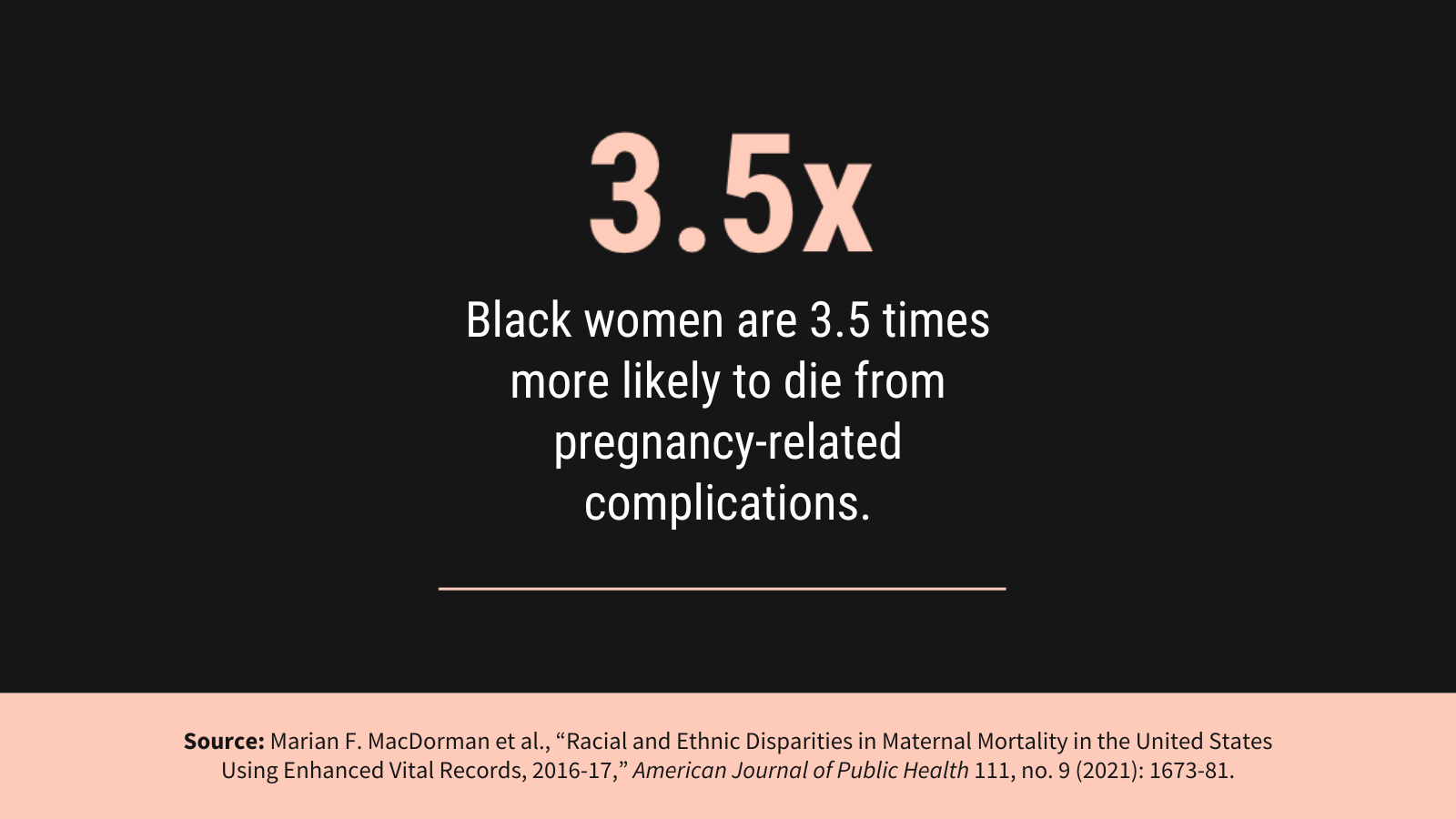
To raise awareness of the Black maternal health crisis in the United States, PRB partnered with creative agency TANK Worldwide and Dr. Shalon’s Maternal Action Project on a 2023 national campaign. It featured data from PRB’s article on NICHD-funded research that found U.S. Black women are 3.5 times more likely to die of pregnancy and postpartum complications than white women. With our partners, we promoted the campaign and research through social media, a press release, and fact sheet, and caught the attention of media, including NPR’s Here and Now. The campaign won a Clio Health award, which recognizes creative marketing and communications in the fields of physical, mental, and social well-being.
Read our follow-up interview with Marie Thoma about emerging research on this crisis.
Sharing learning that can improve health outcomes for small and sick newborns
Project: MOMENTUM Knowledge Accelerator
Funder: USAID
How can local learning drive global solutions? This question is one we ask daily on the MOMENTUM Knowledge Accelerator project, which is part of USAID’s larger MOMENTUM program that seeks to improve the health and well-being of women, children, and families in more than 38 countries. Part of the project’s role is to identify and share best practices that can be applied across the different settings where MOMENTUM works.
In 2023, MOMENTUM Knowledge Accelerator brought together project staff who are working with their country counterparts to adopt and adapt the World Health Organization’s model of care for small and/or sick newborns in Indonesia, Mali, Nepal, and Nigeria. The goal? Develop a set of common questions and tools to learn about the model’s early rollout in different settings. For instance, how acceptable is the model in these settings? How feasible is it to implement the model in the different country contexts and settings? What adaptations are needed to the model based on the health systems’ contexts? The experiences in each country so far show that when health system and community actors are properly engaged, the model is acceptable, appropriate, and feasible in each setting. If governments can continue to provide resources to support the model’s different elements, more newborns can survive and thrive.
Using this information, we are working to share common approaches and address factors like how different aspects of the health system and variations between the public and private sectors affect the model’s implementation. Identifying and sharing such early insights can help shape global learning and strengthen the quality of care that small and sick newborns receive from their local health care providers—changing and improving lives.
This example is just one of the ways that we collaborate and communicate, gathering and assessing knowledge to share insights that people can put into practice.
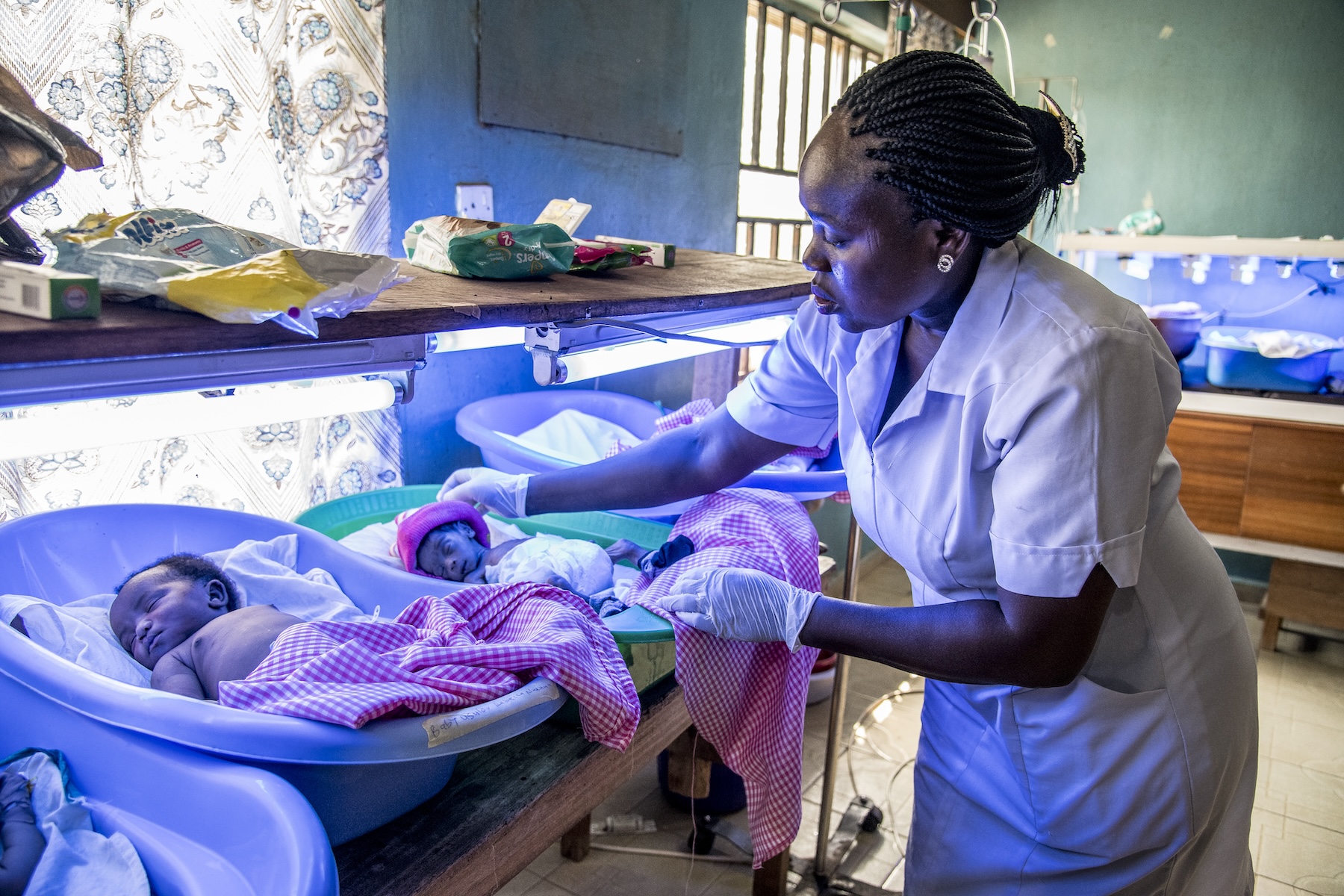
Photo credit: Karen Kasmauski/MCSP
Facilitating high-level policy dialogue in Senegal about women’s unpaid care work
Project: Counting Women’s Work
Funder: William and Flora Hewlett Foundation
Resources—and financial burdens—flow from one generation to another. Understanding how it happens is key for governments focused on fostering sustainable development, and data from national transfer accounts (NTA) can provide key insights.
In 2023, PRB and the Regional Consortium for Research on Generational Economy (CREG) hosted a shared space in Senegal to make complicated topics like the value of women’s unpaid labor easy to understand so decisionmakers could assess needs and accountability. The 3rd National Transfer Account–Africa Conference in La Somone-Senegal, held in partnership with CREG, PRB, the United Nations Population Fund, and United Nations Economic Commission for Africa, brought together more than 130 participants from 19 African countries, including parliamentarians and decisionmakers from various ministries.
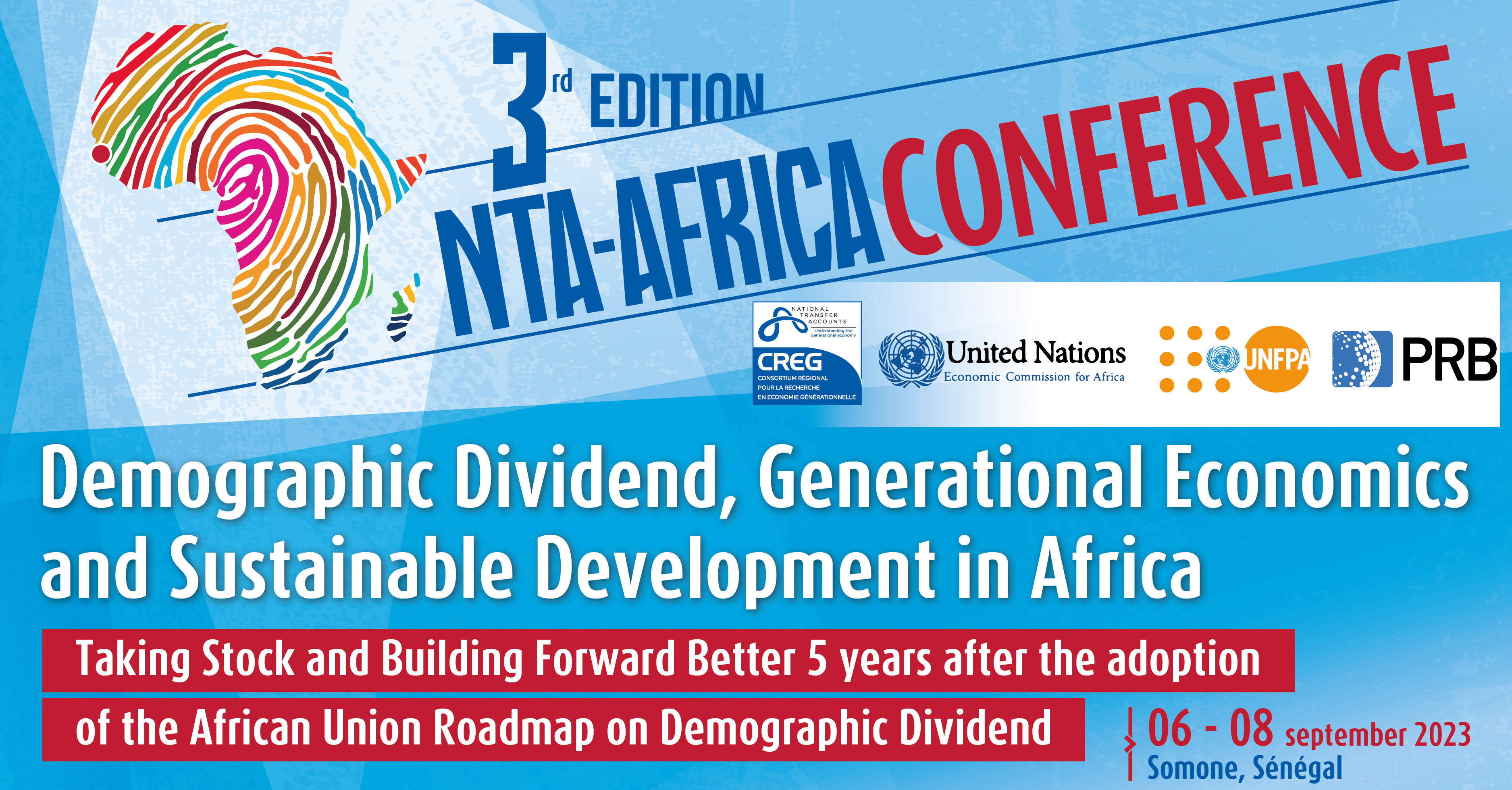
The Africa NTA Network, drawn by our reputation for facilitating high-level policy dialogue informed by data, chose PRB to moderate three of four plenary conference sessions. Africa Director Aïssata Fall facilitated a session on the importance of unpaid care work and achieving a demographic dividend, which featured key messages developed by PRB policy communication fellows participating in the conference. She also directed two plenary sessions focused on high-level policy dialogue with parliamentarians and decisionmakers from ministries of planning, budget, gender, and social affairs. They came together to discuss challenges related to the demographic dividend and the care economy and the difficulty of translating these complex and often-abstract concepts so they can be considered in practical applications.
Calling for a new approach to climate adaptation driven by local solutions
We developed a three-part climate blog series in English and French to advance a new approach to investments in climate adaptation that integrate population, gender, health, and the environment. The series lays the foundation of a people-centered framework for building resilience to climate change centered on agency, equity, and the power of local solutions.
And, in a year that closed as the hottest on record, solutions are more urgent than ever, as is knowing how—and which—populations will be most affected by climate change. Population characteristics like age, gender, and socioeconomic status are a few of the factors that make some people more vulnerable to the effects of a changing climate. Understanding them can help countries adapt and build resilience to future climate-related events, and we put a spotlight on this topic in our 2023 World Population Data Sheet.
We also worked with researchers participating in the 2023 ARUA Climate Change and Inequalities Symposium at the University of Cape Town to provide feedback and coaching on their presentations, which were focused on social inequalities and climate change action, so they could deliver clear, compelling messages. Read our top five tips to make your presentation message stand out.

Reporting the evidence on family experiences of care in California during the COVID pandemic
Project: KidsData
Funder: Lucille Packard Foundation for Children’s Health, California Department of Public Health, Blue Shield Foundation of California, donations from data users
The year 2023 marked the official end of the COVID-19 state of emergency. Yet the disease continued to spread, and many people continued to feel its effects. Decisionmakers need evidence of these impacts so they can effectively plan for their communities.
PRB’s KidsData program released data and findings from the Family Experiences During the COVID-19 Pandemic survey that highlighted ongoing challenges. The survey checked in with parents and caregivers four times to track the pandemic’s evolving impact on families. The results released in 2023 showed persistent challenges for California families despite suggestions that life had returned to normal.

In California, three years after the pandemic’s onset, children still faced significant COVID-related challenges, and their caregivers remained concerned. As safety-net supports began to roll back, nearly half of parents and caregivers statewide (45%) said their household finances were negatively impacted since the start of the pandemic, up from 32% a year prior. And more than half (58%) said they worried for the safety of their children as public health measures, like masking mandates, relaxed. Rates of concern were even higher in households with children with special health care needs.
The pandemic’s effects on young people are of particular concern as adverse childhood experiences, especially in early childhood, can have negative, long-term impacts on health and well-being. KidsData remains committed to tracking and analyzing data on the health and well-being of California’s children.
Advancing gender equality to improve family planning and reproductive health outcomes
Project: PROPEL Health
Funder: USAID
How can gender-transformative approaches and programming help improve outcomes for family planning and reproductive health? How can we address the gender inequities that global health workers experience? What are the links between sexual and reproductive health and technology-facilitated gender-based violence? What intersectional approaches are being applied to gender-transformative programming? How can comprehensive sexuality education help strengthen gender-based violence prevention and response efforts and vice versa?
If you are among the more than 2,600 members of the Interagency Gender Working Group (IGWG), you may already know the answers to these questions.
For 13 years, PRB managed the IGWG, a community of practice founded nearly 30 years ago to promote gender-sensitive considerations as a critical factor in improving family planning and reproductive health outcomes and advancing sustainable development.
Under our management, the IGWG highlighted best practices, challenges, and opportunities for promoting gender equality through global health programming, showcased the work of gender experts and advocates around the world, and led discussions on cutting-edge topics on and approaches to gender-transformative health programming.

In late 2023, we transitioned management of the IGWG to the PROPEL Youth and Gender project. During its time with PRB, the IGWG served as a reputable resource for gender experts, advocates, and program implementers working in global health and other sectors. It centered and elevated the voices of gender experts, advocates, and researchers, with special attention to locally led efforts, and the community of practice made notable contributions to the field with products that captured a wealth of knowledge and actionable recommendations for practitioners, advocates, researchers, and donors.
Both seasoned experts and those just beginning to integrate a gender-sensitive lens into their activities rely on materials like the IGWG’s newsletter and signature Gender Integration Continuum, a valuable tool for program implementers that measures whether and how interventions incorporate gender equity to improve development outcomes.
Explore some of our work with the IGWG:
- Recommendations to address the gender inequities facing global health workers (plenary brief).
- Links between comprehensive sexuality education and gender-based violence prevention and response efforts (blog).
- Links between technology-facilitated gender-based violence and sexual and reproductive health (blog).
- Intersectional approaches in gender-transformative programming (event).
- Gender-transformative approaches in global health (research brief).
- Key concepts around gender and health for a range of audiences (training materials).
- Key takeaways from events and recommendations (synthesis products).
We look forward to watching the IGWG’s continued growth and success.
Strengthening policies that benefit communities’ health by collaborating locally in Kenya
Project: Stawisha Pwani
Funder: USAID
As part of our activities on the Stawisha Pwani project, we collaborated with county officials, youth, and others in four coastal counties in Kenya as they sought to create and strengthen policies concerning the health of people in their communities.
We worked with officials in Mombasa County’s Department of Health to bring together youth representatives, county officials, and other stakeholders in the private sector and at nongovernmental organizations to develop the Mombasa County Adolescent and Young People Strategy on Health for 2024-2029. In our role of helping to facilitate dialogue, we drafted a template for the strategy and a plan for communicating its benefits to decisionmakers, and then formed a youth technical working group to draft, review, and revise the policy before it was shared with stakeholder groups for their feedback.

This collaborative process resulted in a strategy—approved by the Mombasa County government—that is in use today, helping to guide decisions across County departments on high impact programming for adolescents and young people.
In Taita Taveta County, we helped advance policy change by providing technical assistance to officials reviewing the Health Financing Facility Improvement Fund (FIF) law and developing the FIF operations and supervision manual. The FIF provides a way to collect and manage revenue from the health services delivered by public health facilities, as well as for these facilities to use the revenue to improve service delivery. The County and Subcounty Health Management Teams are relying on the manual as they monitor revenue collection to ensure resources are being used practically and to increase accountability.
The manual’s guidelines and revisions to the FIF law that allow facilities to retain and use revenue—a key element for strengthening health systems in Taita Taveta—contributed to the Department of Health surpassing its FIF collection targets for Fiscal Year 2022-2023. The Taita Taveta County Annual Development Plan 2024/25 reports that the collection goal of KES 100,000,000 was exceeded by more than 50%, for a total of KES 161,118,235. The health facilities can use these additional resources to further improve their efforts to meet the needs of the communities they serve.
![]()
SHARING THE EVIDENCE
PRB produced articles, blogs, reports, webinars, and other materials in 2023 on a range of topics such as climate adaptation, gender equality, population aging, unpaid care work, and the U.S. labor shortage. Explore some of these works here.
Climate Adaptation
2023 World Population Data Sheet
A New Approach for Climate Resilience
Elements of Climate Resilience: The Foundations of a People-Centered Framework
Five Actions to Help Build Equitable Climate Resilience
Gender Equality
Gender Equity for Work and Pay
Population Data, Aging, and Growth
Eight Demographic Trends We’re Watching as the World Population Passes 8 Billion
PRB CEO Calls for Restoring Public Trust in Data at United Nations Development Event
Self-Care
Comment l’autosoin peut soutenir la résilience en Afrique de l’Ouest et du Centre
How Self-Care Can Support Resilience in West and Central Africa
Unpaid Care Work
To Fix the Care Economy, the United States Should Look Internationally
U.S. Labor Shortage, State Policies, and Health
Want Another Perspective on the U.S. Labor Shortage? Talk to a Demographer
SUPPORTERS, PARTNERS, AND CONTRIBUTORS
The generous support we receive from organizations and individuals helps make our work possible. Thank you.
- American Association of Retired Persons (AARP)
- Annie E. Casey Foundation
- Appalachian Regional Commission
- Association of Monterey Bay Area Governments
- Association of Public Data Users
- Blue Shield of California Foundation
- Conrad N. Hilton Foundation
- Education Sub-Saharan Africa
- Eunice Kennedy Shriver National Institute of Child Health and Human Development
- John D. and Catherine T. MacArthur Foundation
- Lucile Packard Foundation for Children’s Health
- LVCT Health
- Coordinating Center for the Centers on the Demography and Economics of Aging and Alzheimer’s Disease and Related Dementias, University of Michigan
- New Venture Fund
- NORC at the University of Chicago
- The Palladium Group
- Population Council
- San Benito Council of County Governments
- The San Diego Association of Governments
- Southern California Association of Governments
- United Nations Population Fund
- United States Agency for International Development
- United States Census Bureau
- University of Utah
- William and Flora Hewlett Foundation
PRB worked together with 19 organizations in 2023.
- African Centre of Excellence for Inequality Research
- Amref Health Africa
- Avenir Health
- Consortium Regional pour la Recherche en Economie Générationnelle (CREG)
- Developing Radio Partners
- Green Girls Platform
- Innovations Environnement Développement en Afrique
- Institute for Climate and Sustainable Cities
- Institute of Public Finance Kenya
- JSI Research & Training Institute Inc.
- Makerere University School of Public Health
- Manhattan Strategy Group (MSG)
- The Nature Conservancy
- Population Association of America (PAA)
- President and Fellows of Harvard College, Ariadne Labs
- The Regents of the University of California, Berkeley Campus
- SERAC-Bangladesh
- World Vision, Inc.
- Zenysis Technologies
Through their generous contributions, the individuals listed here allowed PRB to fund essential program expansion and organizational innovations during the fiscal year ending Sept. 30, 2023.
- Tom Anderson
- Amaia Bacigalupe
- Amazon Smile
- Bill Baird
- Felicity Barringer Taubman
- Donald J. Begin
- Nancy Bliss
- William P. Butz
- Adrian Calahan
- Daniel L. Carrigan
- Julie A. Caswell and Richard T. Rogers
- George Cernada
- Suthasina Chaolertseree
- Yoonjoung Choi
- Stacy Clinton
- Joel Cohen
- Donald A. Collins
- Geoff Dabelko
- Sandy Davis
- Richard Deiss
- Carol Devita
- Thomas Dillon
- Peter and Nancy Donaldson
- Mariner Eccles
- Ecotrust/Peter Vaughn
- Janet Edmond
- McKena Elzey
- David Emma
- Karl Eschbach
- Marilyn Fernandez
- Juan Gili Ferran
- Robert Freymeyer
- Janine Gawel
- Justus Goedtke
- Nihal Goonewardene
- Linda Gordon
- John Grant
- Kenneth Haddock
- Riyad Hakim
- Arther Hampson
- Todd Harman
- Shawn Hazboun
- Hygino Hercules
- Harold Hill
- Steven Houser
- Robin Ikeda
- Robert Jacques
- Amber Jackson
- Beth Jarosz
- Bobby Jefferson
- Jeffrey Jordan
- Joan Kahn
- Abiodun Kaka
- Willie B. Lamouse-Smith
- Bryan Larson
- Thomas LeGrand
- Jennifer Madans and Terence Phillips
- Dalton Mallonee
- Andrew Marvel Family Trust
- Francis Mathieu
- Lawrence McCarthy
- Kari McGuide
- Norman Meadow
- Sara Melillo
- Joel and Mary Mellema
- David Miller
- Andy Neill
- New Venture/Census
- Ashley Parris
- Jeffrey Passel
- Ayesha Patel
- Kari Pei
- Clyde Phillips
- Nathan Porter
- Ann Ruegg
- Karl Schmitt
- Valedmar Schultz
- Jennifer Sciubba
- Osama Senousi
- Kyler Sherman-Wilkins
- Rhonda R. Smith
- Stanley Smith
- Margaret Snowden
- Ross Steele
- John H. Stinson-Fernandez
- Chris Tarp
- Felicity Taubman
- Abhishek Tiwari
- Joana Umo-etuk
- Maddie Walker
- Karoline Walter
- Ann A. Way
- George Weed
- John Weeks
- Mary Beth Weinberger
- Helmut Wohlschlagel
- Mark Wright
- Robert Wyman
